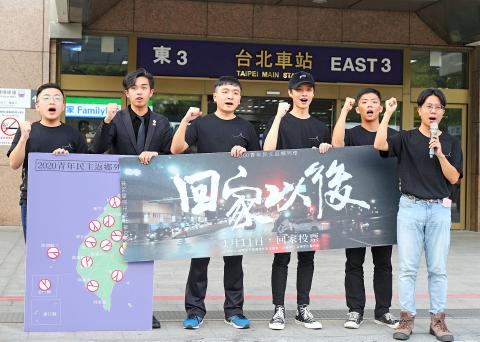Hong Kong pro-democracy advocates and budding politicians have flocked to Taiwan this week to observe its elections.
One delegation of about 50, including a batch of young Hong Kong district councilors who stormed to a landslide electoral victory in November last year, has been networking with key civil leaders, academics and officials.
“We want to learn and gain more experience, to help Hong Kong people as they struggle on their democratic road in the future,” said Raymond Tang (鄧威文), a district councilor who attended an evening seminar in Taipei with fellow delegates on countering fake news.

Photo: CNA
The links between the two places have never been deeper: Hong Kong has been convulsed by more than seven months of anti-China protests and Taiwan’s elections come amid heightened fears of an increasingly assertive China under President Xi Jinping (習近平).
“There’s an acute sense of threat from China. What’s happened in Hong Kong has made everyone reassess its relationship with Beijing,” said Joseph Cheng (鄭宇碩), a veteran pro-democracy advocate and one of the delegation leaders.
“Democracy has taken root in Taiwan and it refutes the basic argument that democracy is for the West, that it doesn’t apply to Chinese people, which is the argument propagated by Beijing,” he added.
In a Facebook video posted late on Thursday, 15 district councilors from Hong Kong, urged Taiwanese to treasure their unfettered democracy and to vote today.
“This time it’s over to you,” they said in a montage. “Hong Kong and Taiwan, let’s go for it together.”
Taiwan has become home to a small, but growing number of Hong Kong protesters who have fled the territory fearing politically motivated charges against them.
About 6,200 immigrants from Hong Kong and Macau are eligible to vote in Taiwan.
Lam Wing-kei (林榮基), a Hong Kong bookseller once abducted by Chinese agents, is trying to rebuild his life in Taiwan opening a new bookstore, set to open in March.
Lam said he is optimistic because of the burgeoning intellectual and political ties between Taiwan and his home.
“What we’re seeing in Taiwan is a country facing a military threat and economic encroachments from China. This is not a good combination and it perpetuates uncertainty,” he said, standing in an empty store space that he plans to fill with thousands of books focused on politics in Taiwan, Hong Kong and China.
“I hope my bookshop can make a little difference, to influence Taiwan, and raise their awareness,” Lam added.

Taipei has once again made it to the top 100 in Oxford Economics’ Global Cities Index 2025 report, moving up five places from last year to 60. The annual index, which was published last month, evaluated 1,000 of the most populated metropolises based on five indices — economics, human capital, quality of life, environment and governance. New York maintained its top spot this year, placing first in the economics index thanks to the strength of its vibrant financial industry and economic stability. Taipei ranked 263rd in economics, 44th in human capital, 15th in quality of life, 284th for environment and 75th in governance,

Greenpeace yesterday said that it is to appeal a decision last month by the Taipei High Administrative Court to dismiss its 2021 lawsuit against the Ministry of Economic Affairs over “loose” regulations governing major corporate electricity consumers. The climate-related lawsuit — the first of its kind in Taiwan — sought to require the government to enforce higher green energy thresholds on major corporations to reduce emissions in light of climate change and an uptick in extreme weather. The suit, filed by Greenpeace East Asia, the Environmental Jurists Association and four individual plaintiffs, was dismissed on May 8 following four years of litigation. The

A former officer in China’s People’s Liberation Army (PLA) who witnessed the aftermath of the 1989 Tiananmen Square massacre has warned that Taiwan could face a similar fate if China attempts to unify the country by force. Li Xiaoming (李曉明), who was deployed to Beijing as a junior officer during the crackdown, said Taiwanese people should study the massacre carefully, because it offers a glimpse of what Beijing is willing to do to suppress dissent. “What happened in Tiananmen Square could happen in Taiwan too,” Li told CNA in a May 22 interview, ahead of the massacre’s 36th anniversary. “If Taiwanese students or

The New Taipei City Government would assist relatives of those killed or injured in last month’s car-ramming incident in Sansia District (三峽) to secure compensation, Mayor Hou You-yi (侯友宜) said yesterday, two days after the driver died in a hospital. “The city government will do its best to help the relatives of the car crash incident seek compensation,” Hou said. The mayor also said that the city’s Legal Affairs, Education and Social Welfare departments have established a joint mechanism to “provide coordinated assistance” to victims and their families. Three people were killed and 12 injured when a car plowed into schoolchildren and their